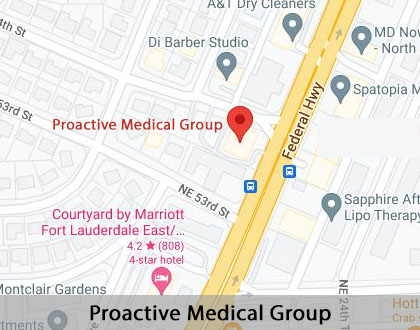General Illnesses Fort Lauderdale, FL
A primary care doctor is a trusted resource for the treatment of general illnesses. Seeing these medical professionals for common illnesses is a safe and effective way to promote overall health and wellness. Professional medical treatment is key to relieving symptoms and promoting recovery.
If you are experiencing an illness or have concerning symptoms, do not hesitate to see a primary care doctor. Our team at Proactive Medical Group can help. Call us today at (954) 938-2843 to learn more about our services or schedule an appointment.
General Illnesses a Primary Care Doctor Can Treat
A primary care doctor is an instrumental part of the healthcare system, helping patients live healthier lives. They can treat most medical conditions that are not emergencies. Patients with common illnesses can receive prevention tips and treatment.
Primary care doctors have the training to assist in various aspects of healthcare. However, if a patient requires more focused treatment, a primary doctor can refer patients to a specialist. Some of the general illnesses treated by a primary care doctor include:
“They [primary care doctors] can treat most medical conditions that are not emergencies.”
When to Seek Treatment
We will examine the patient and review their medical history to determine the illness and the official cause. We can provide treatment for a variety of conditions and general illnesses to meet the patient's needs. While many illnesses are not life-threatening, we understand that they can hinder one's quality of life and get in the way of daily tasks. Thus, we can offer professional treatment to help the situation.
Unlike most other doctors, people do not only see their primary care doctor when they are sick. Patients can also see their primary provider for questions about their health, immunizations, and more. People who are feeling under the weather can also make an appointment with a primary care doctor for an examination, diagnosis, and treatment plan.
“Patients can also see their primary provider for questions about their health, immunizations, and more.”
Treatment Options
While a minor sore throat or cold may only require rest, a more severe illness may require intervention from a medical professional. For example, a patient with strep throat may need antibiotics to treat and relieve symptoms. Many patients do not listen to their bodies and will ignore an illness until it worsens. The sooner people seek treatment, the better chance of a quick recovery. A 2019 study found that patients who had a primary care doctor received significantly more high-value care. By seeking our treatment and medical expertise, we can help find the most effective treatment for the patient's needs.
The right treatment option will vary for each patient and their illness. A primary care doctor will examine patients, order tests, make a diagnosis, and prescribe medications when necessary. A primary care doctor can also help patients with chronic illnesses like diabetes, hypertension, asthma, or chronic obstructive pulmonary disorder (COPD). We can provide various treatment methods and personalized treatment plans since every patient is different.
“A 2019 study found that patients who had a primary care doctor received significantly more high-value care.”
Check out what others are saying about our primary care physician services on Yelp: General Illnesses in Fort Lauderdale, FL
What To Expect
When meeting with a primary care doctor, people will first need to provide them with the necessary patient information. Information about the patient's medical history, healthcare needs, current health status, and symptoms will help the doctor better understand the situation. This will allow our team to determine a proper diagnosis and effective treatment plan. Before going to their appointment, patients should make a list of questions and concerns they want to address about their situation.
During the appointment, the primary care doctor will conduct a physical examination and ask the patient questions about the symptoms of their illness. If necessary, the doctor may also order additional tests to aid in diagnosis. After patients receive a diagnosis and treatment plan, they may need follow-up visits to treat their illness.
“Information about the patient’s medical history, healthcare needs, current health status, and symptoms will help the doctor better understand the situation.”
Questions Answered on This Page
Q. What general illnesses can a primary care doctor treat?
Q. When should people see a primary care doctor?
Q. What treatment options are available for general illnesses?
Q. What should patients expect during an appointment with a primary care doctor?
People Also Ask
Q. What ENT symptoms require medical attention?
Frequently Asked Questions
Q. What does a primary care doctor do?
A. A primary care physician provides patients with general healthcare to address various health concerns, including general illnesses. These medical professionals are usually the first people a patient will speak to about a health concern. Some reasons to see a primary care doctor include preventative care, common illness treatment, chronic condition management, and to get a referral to a medical specialist.
Q. What are the benefits of seeing a primary care doctor?
A. Seeing the same primary care doctor for years allows patients to build a trusting relationship with them. This allows the doctor to have comprehensive knowledge about a patient, their health, and their medical needs. As a result, primary doctors can deliver more personalized care with this added insight.
Q. What education and training does a primary care doctor have?
A. To become a primary care doctor, a person must first earn an undergraduate degree in pre-med or the sciences. After, they must graduate from an accredited medical school and pass the board exams for the United States Medical Licensing Examination (USMLE) or the Comprehensive Osteopathic Medical Licensing Examination of the United States (COMPLEX-USA). After, they must complete clinical instruction or core clerkships and finish a residency program with required rotations.
Q. What is the difference between an acute and chronic illness?
A. An acute illness typically occurs suddenly and does not last for a long time. On the other hand, chronic conditions usually develop slowly and can worsen over time. A primary care doctor can help patients address both types of illnesses.
Q. How can a primary care doctor help patients with a chronic illness?
A. A primary care doctor can coordinate their treatment with specialists. They can also prescribe medications to manage their condition and adjust them as needed. If necessary, the doctor can perform lab tests to monitor a patient's health and progress.
Start Feeling Better – Visit Us Today
By visiting us as soon as possible, our team can help get you the professional treatment you need. Instead of waiting around and allowing the symptoms to get worse, we can provide you with treatment options.
Definition of Medical Terminology
Call Us Today
Our team at Proactive Medical Group can help get you the professional treatment you need for general illnesses. Do not hesitate to seek treatment. Call us today at 954-938-2843 to learn more about our services or schedule an appointment.
Helpful Related Links
- American Diabetes Association. American Diabetes Association. 2023
- American Headache Society. American Headache Society. 2023
- American Heart Association. American Heart Association. 2023
- American Journal of Medicine. American Journal of Medicine. 2023
- American Lung Association (ALA). American Lung Association (ALA). 2023
- American Medical Association (AMA). American Medical Association (AMA). 2023
- Asthma and Allergy Foundation of America. Asthma and Allergy Foundation of America. 2023
- CDC Respiratory Health Resources. CDC Respiratory Health Resources. 2023
- Health and Human Services Reproductive Health Services and Resources. Health and Human Services Reproductive Health Services and Resources. 2023
- National Library of Medicine MedlinePlus. National Library of Medicine MedlinePlus. 2023
- Stanford Children’s Health. Stanford Children’s Health. 2023
About our business and website security
- Proactive Medical Group was established in 2022.
- We accept the following payment methods: American Express, Cash, Check, Discover, MasterCard, and Visa
- We serve patients from the following counties: Broward County
- We serve patients from the following cities: Fort Lauderdale, Oakland Park, Wilton Manors, Pompano Beach, and Sea Ranch Lakes
- Norton Safe Web. View Details
- Trend Micro Site Safety Center. View Details
Back to top of General Illnesses










